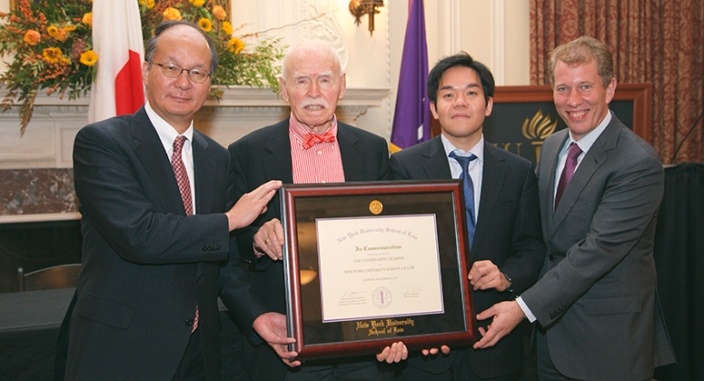Japan Grants NYU Law $5 Million
From left to right: Japanese Ambassador Reiichiro Takahashi, Jerome Cohen, Ren Ito and NYU Law Dean Trevor Morrison accepting the five million dollar donation from the Japanese government to the NYU Law U.S.-Asia Institute.
November 27, 2017
The government of Japan granted the NYU School of Law U.S.-Asia Law Institute $5 million earlier this month to advance education in comparative and international law so as to further the engagement between the United States and Asia when it comes to solving legal conflicts.
According to the institute’s website, USALI is a leading research center based in the U.S. and focused in the study of law in Asia. The center also serves as a partner and resource for various Asian countries as they develop their legal systems, the website said.
The grant was recognized with a ceremony held at NYU School of Law, following USALI’s 23rd Annual Timothy A. Gelatt Memorial Dialogue event on the Rule of Law in East Asia.
NYU Law Public Affairs Officer Michelle Tsai said that the purpose of the gift from Japan’s government is to enable USALI to continue its work in promoting the understanding and use of international law to resolve conflicts. Tsai also said the gift is not directly for the purpose of promoting the study of Japanese law.
“That said, USALI’s relationship with Japan has deepened over the years, and the institute has, for many years, worked with scholars and practitioners from Japan on international law as well as comparative law,” Tsai said.
According to NYU Law’s website, USALI regularly hosts two to four visiting Japanese scholars whose research relates to the law for one year. This year, three visiting scholars will be at the institute for a full year as well as two additional scholars for shorter periods.
NYU Law was the first American law school to initiate, through USALI, a program for a public interest lawyer chosen by the Japanese Federation of Bar Associations to come as a visiting scholar each year, according to Tsai.
Tsai said that USALI held its first program in Japan on comparative wrongful convictions this past year and that the program grew out of a month-long NYU-based program in which Japanese visiting scholars participated. Tsai also said that with the assistance of another visiting scholar from Japan, USALI organized a one-week program this past year for a dozen Japanese criminal defense lawyers to study the role and responsibilities of American criminal defense lawyers at the earliest stages of a case.
Wilf Family Professor of Property Law Frank Upham, who teaches comparative law with an emphasis on East Asian countries and has written books and articles about Japanese law and society, said USALI is an important and unique space to exchange ideas and information.
“This is an invaluable and rare opportunity for Japanese judges, lawyers and scholars to discuss their research with their colleagues from the [United States], China, Taiwan and Korea,” Upham said. “From a different perspective, we have now a tradition of social gatherings that have been initiated and organized mainly by our Japanese [Visiting Scholars].”
The USALI visiting scholars also participate in NYU classes and enrich discussions of international and comparative law.
“There are students at all of our events,” Upham said. “[Visiting Scholars] from Japan and elsewhere audit classes and help [Juris Doctor] students with research and papers. Students also get a chance to network with Japanese lawyers, judges and academics.”
USALI also plans to offer a class in Fall 2018 on comparative criminal justice. The class will cover Japan, China and the U.S. USALI Executive Director Ira Belkin will co-teach the course with a professor from Japan.
“In addition, USALI welcomes students to work as student scholars,” Tsai said. “One of the institute’s student scholars accompanied the USALI delegation to Japan this past June.”
A version of this article was published in the Monday, Nov. 27 print edition. Email Christine Lee at [email protected].



























































































































































